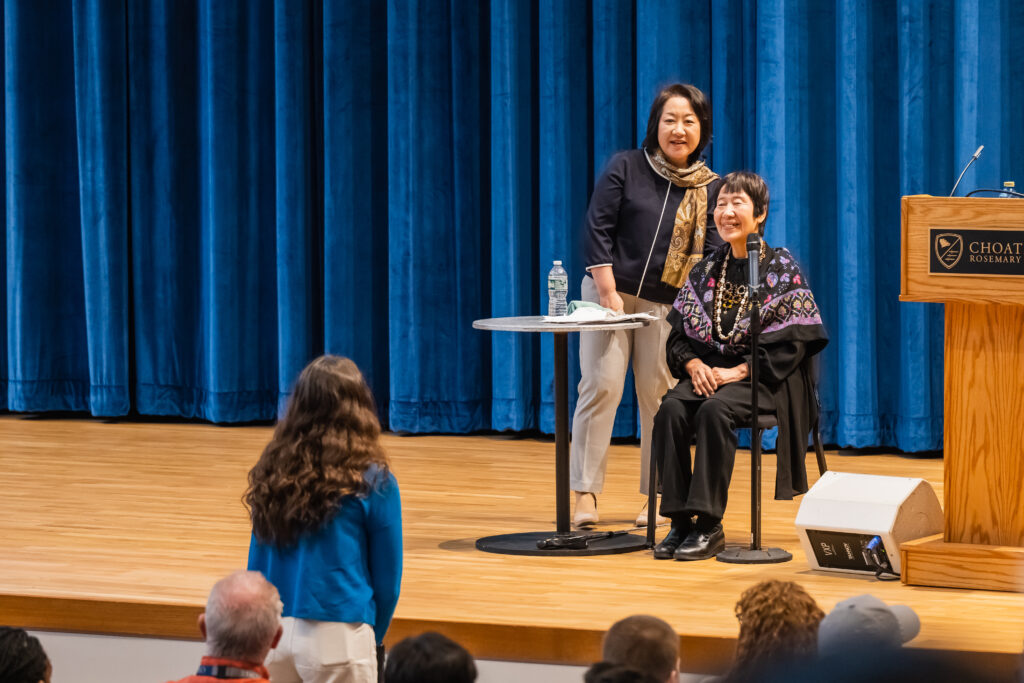
Ms. Toshiko Tanaka was six years old when Americans dropped the atomic bomb on the Japanese city of Hiroshima in 1945. Just weeks before the bomb was dropped, her family had moved houses from the hypocenter of the atomic bomb to just outside the radius of its impact. While it was too painful to recount the experiences for most of her life, she later began sharing what happened to her through talks at schools and on TV to ensure that this experience is not lost to history. On April 4, she gave a presentation at Choate’s School Meeting, sharing her story.
To begin the sharing, Tanaka’s daughter, second-generation survivor Ms. Reiko Tashiro, shared the story of the day she was born. She explained that the first thing her father did after she was born was count her toes, fearful of the effects of Ms. Tanaka’s possible radiation poisoning on their daughter. Her powerful story showed that the atomic bomb not only had consequences on immediate victims and survivors, but also had lasting consequences that burden them for the rest of their life. Philosophy teacher Mr. James Davidson, who worked to organize the event, said, “I hope that they [the Choate community] would have a firsthand and personal account of the real world risks of nuclear weapons, partifuclalry right now, where there are an area of serious conflict in the US, and in the world.”
Then, Ms. Tanaka herself shared the harrowing experience of being a survivor of the atomic bomb. On August 5, 1945, she was a young girl walking to school, when suddenly a bright light covered her vision. She threw her arm over her face before feeling a searing heat all around her. Then, interminable darkness blanketed her vision as the dust and ash from the initial bomb impact blocked the sun. While her arm filled with searing pain, she struggled to decide whether to continue her walk to school or return home, entirely unsure of what had happened. Later in life, she learned that out of her entire kindergarten class, she was the only confirmed survivor of the attack on Hiroshima.
The suffering did not end at the initial blast of heat and impact: it continued in the form of radiation. Despite how little her family had, Ms. Tanaka’s mother took in and cared for many survivors. However, many of them did not survive past days or weeks, dying slow deaths from radiation poisoning. The cause of the deaths was unknown then, as many survivors did not learn the extent of radiation poisoning until as long as six years after the blast.
When an audience member asked about the medical support they were given, Ms. Tanaka shared that there was no support for the Hiroshima survivors from the government for 30 years. Survivors were anxious about the effects of the radiation on both their future selves and their offspring, which tied back to the story of Reiko’s birth.
Following School Meeting, students were welcome to attend a debrief session and additional Q&A session in the Humanities Rotunda with both speakers. Emily Mito ’24, who attended the Q&A, said, “I already knew all the stories of the atomic bomb since I grew up in Japan and learned a lot about it in school, but it was … special to hear the story in the U.S. with my American friends in this high school setting.”
Mito also shared that, in the Q&A, she learned that Ms. Tanaka still lives in Hiroshima, as she has for the last 70 years. After asking about how Ms. Tanaka balanced living in the place where such a tragedy had occurred, Mito said, “She told me how when she talks about the story, it is important to tell everyone not only the tragic part of the history, but also the present day of Hiroshima.” This takeaway aligned with the goals that Ms. Tashiro and Ms. Tanaka hoped students would take away from the discussion.
Ms. Tashiro said that she wanted students to “to have empathy” and “know that behind the facts of history, each victim had their name and was loved by someone.” The Hiroshima bombing should not be something that is considered to be entirely in the past, as its effects are still rippling through those who survived and those who didn’t.




